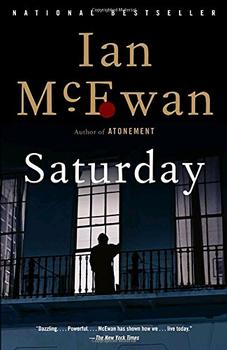Summary | Excerpt | Reading Guide | Reviews | Beyond the Book | Readalikes | Genres & Themes | Author Bio

By means of balancing and doubling, he was able to perform major surgery in one theatre, supervise a senior registrar in another, and perform minor procedures in a third. He has two neurosurgical registrars in his firm at present—Sally Madden who is almost qualified and entirely reliable, and a year-two registrar, Rodney Browne from Guyana, gifted, hardworking, but still unsure of himself. Perowne's consultant anaesthetist, Jay Strauss, has his own registrar, Gita Syal. For three days, keeping Rodney at his side, Perowne moved between the three suites—the sound of his own clogs on the corridor's polished floors and the various squeaks and groans of the theatre swing doors sounded like orchestral accompaniments. Friday's list was typical. While Sally closed up a patient, Perowne went next door to relieve an elderly lady of her trigeminal neuralgia, her tic douloureux. These minor operations can still give him pleasure—he likes to be fast and accurate. He slipped a gloved forefinger into the back of her mouth to feel the route, then, with barely a glance at the image intensifier, slid a long needle through the outside of her cheek, all the way up to the trigeminal ganglion. Jay came in from next door to watch Gita bringing the lady to brief consciousness. Electrical stimulation of the needle's tip caused a tingling in her face, and once she'd drowsily confirmed the position was correct—Perowne had it right first time—she was put down again while the nerve was "cooked" by radiofrequency thermocoagulation. The delicate trick was to eliminate her pain while leaving her an awareness of light touch—all done in fifteen minutes; three years' misery, of sharp, stabbing pain, ended.
He clipped the neck of a middle cerebral artery aneurysm—he's something of a master in the art—and performed a biopsy for a tumour in the thalamus, a region where it's not possible to operate. The patient was a twenty-eight-year-old professional tennis player, already suffering acute memory loss. As Perowne drew the needle clear from the depths of the brain he could see at a glance that the tissue was abnormal. He held out little hope for radio- or chemotherapy. Confirmation came in a verbal report from the lab, and that afternoon he broke the news to the young man's elderly parents.
The next case was a craniotomy for a meningioma in a fifty-three-year-old woman, a primary school headmistress. The tumour sat above the motor strip and was sharply defined, rolling away neatly before the probing of his Rhoton dissector—an entirely curative process. Sally closed that one up while Perowne went next door to carry out a multi-level lumbar laminectomy on an obese forty-four-year-old man, a gardener who worked in Hyde Park. He cut through four inches of subcutaneous fat before the vertebrae were exposed, and the man wobbled unhelpfully on the table whenever Perowne exerted downwards pressure to clip away at the bone.
For an old friend, a specialist in Ear, Nose and Throat, Perowne opened up an acoustic in a seventeen-year-old boy—it's odd how these ENT people shy away from making their own difficult routes in. Perowne made a large, rectangular bone flap behind the ear, which took well over an hour, irritating Jay Strauss who was wanting to get on with the firm's own list. Finally the tumour lay exposed to the operating microscope—a small vestibular schwannoma lying barely three millimetres from the cochlea. Leaving his specialist friend to perform the excision, Perowne hurried out to a second minor procedure, which in turn caused him some irritation—a loud young woman with an habitually aggrieved manner wanted her spinal stimulator moved from back to front. Only the month before he had shifted it round after she complained that it was uncomfortable to sit down. Now she was saying the stimulator made it impossible to lie in bed. He made a long incision across her abdomen and wasted valuable time, up to his elbows inside her, searching for the battery wire. He was sure she'd be back before long.
From Samurai William by Giles Milton. Copyright 2003. All rights reserved. No part of this book may be reproduced in any form without written permission from the publisher, Farrar, Straus and Giroux.
Your guide toexceptional books
BookBrowse seeks out and recommends the best in contemporary fiction and nonfiction—books that not only engage and entertain but also deepen our understanding of ourselves and the world around us.